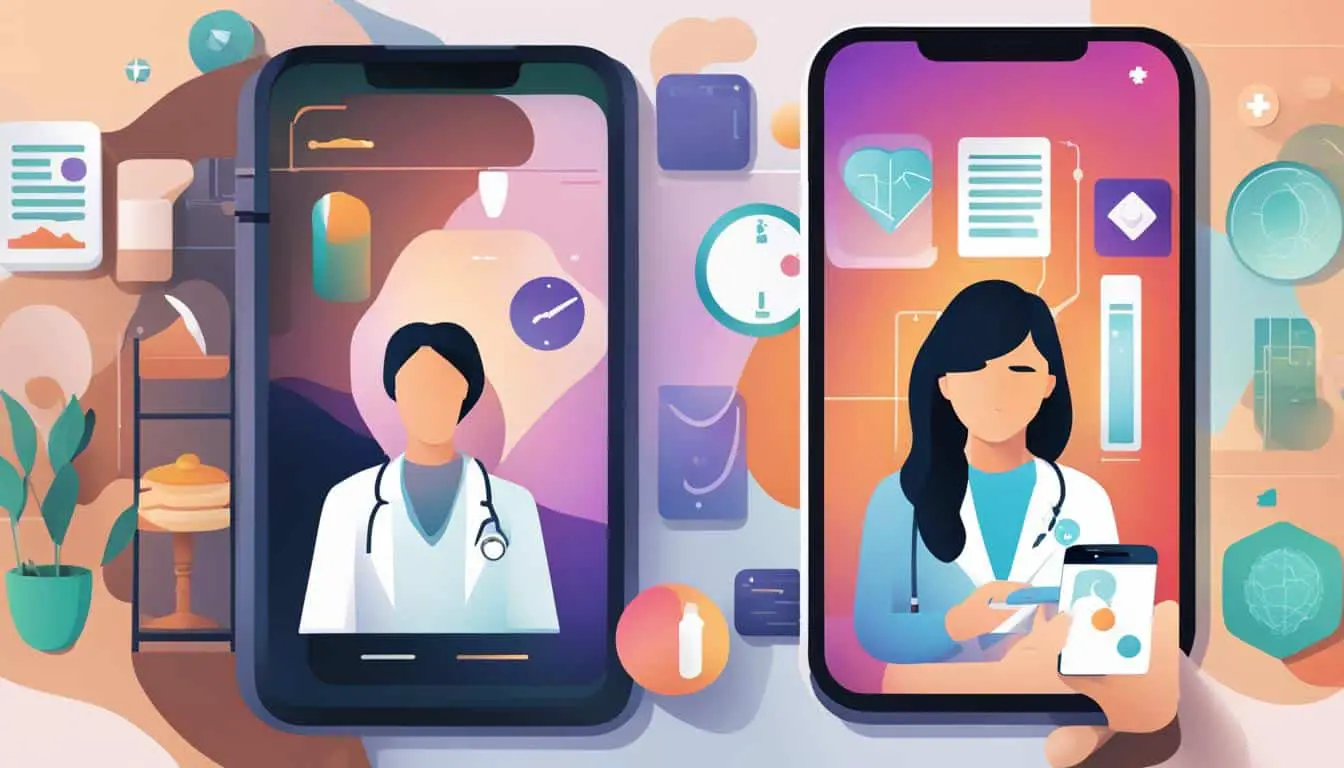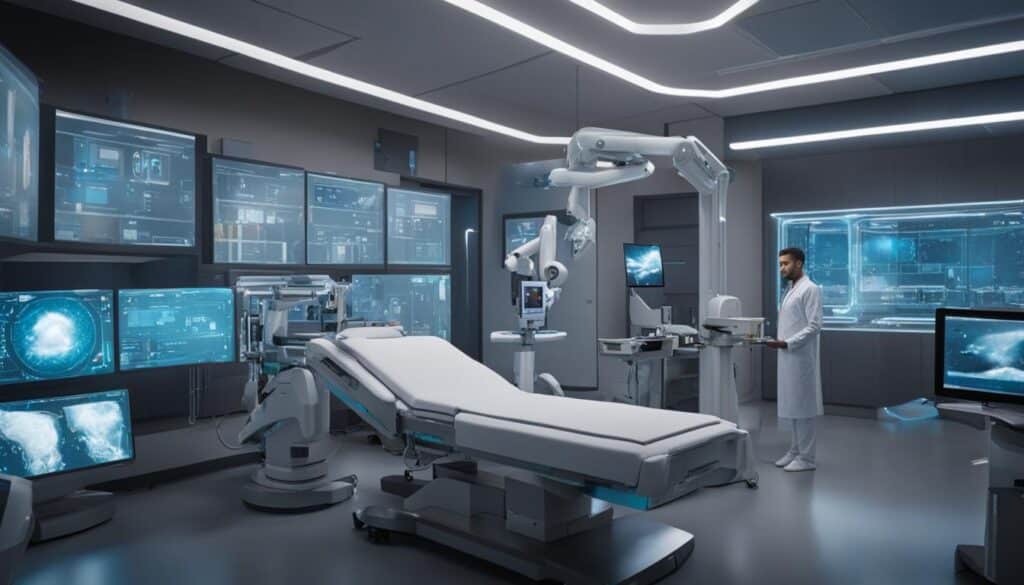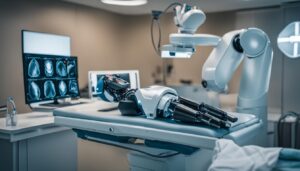
The healthcare landscape is evolving rapidly, driven by advancements in technology. One area that has seen significant progress is the use of artificial intelligence (AI) in managing chronic diseases. AI is revolutionizing patient care by providing personalized treatment plans and continuous monitoring, enabling healthcare providers to deliver more effective and tailored care to patients.
With AI, healthcare providers can analyze vast amounts of patient data, including medical records, lab results, and genetic information, to develop personalized treatment plans. These plans take into account the unique characteristics of each patient, such as genetic predispositions and lifestyle factors, to optimize health outcomes and improve quality of life.
Furthermore, AI-powered monitoring systems allow healthcare professionals to remotely track patients’ health metrics in real-time. This continuous monitoring helps identify early warning signs of disease progression or complications, enabling timely intervention and proactive management of chronic conditions.
Key Takeaways:
- AI is transforming chronic disease management by providing personalized treatment plans and continuous monitoring.
- It enables healthcare providers to analyze vast amounts of patient data to develop tailored treatment strategies.
- AI-powered monitoring systems facilitate remote tracking of patients’ health metrics in real-time.
- Continuous monitoring helps identify early signs of disease progression, leading to timely intervention.
- The use of AI in chronic disease management aims to improve patient outcomes and enhance quality of care.
The Benefits of Generative AI in Healthcare Delivery
Generative AI, including large language models, is capturing the attention of healthcare providers, biopharmas, payers, and investors. It promises to make healthcare delivery more efficient, innovative, and effective. By leveraging generative AI tools, healthcare organizations can automate administrative tasks, improve communication between providers, analyze image and data, and enhance care pathway management. This technology has the potential to improve patient outcomes and reduce healthcare costs, addressing root causes of high costs and clinician burnout.
Generative AI in healthcare delivery offers several key benefits:
- Efficiency: Automating administrative tasks, such as appointment scheduling and documentation, allows healthcare providers to allocate more time to patient care. This streamlines workflows and increases overall efficiency in healthcare delivery.
- Effectiveness: Through advanced data analysis and machine learning algorithms, generative AI can provide valuable insights and predictions, enabling healthcare providers to make proactive and informed decisions. This improves the effectiveness of treatment plans and care pathways.
- Innovation: Generative AI enables the development of innovative solutions, such as virtual assistants and chatbots, that can support patient education, engagement, and self-management. These tools enhance the patient experience and give individuals more control over their healthcare journey.
Furthermore, generative AI has the potential to address the challenges faced by healthcare systems, such as the shortage of healthcare professionals and the increasing demand for personalized care. By automating repetitive tasks and leveraging data-driven insights, generative AI can optimize resource allocation and improve healthcare delivery at scale.
One example of generative AI in action is the use of chatbots for patient triage. These chatbots use natural language processing and machine learning algorithms to assess symptoms and guide patients towards appropriate care pathways. This not only reduces the burden on healthcare providers but also improves access to care for patients.
“Generative AI has the potential to revolutionize healthcare delivery by improving efficiency, effectiveness, and innovation in patient care.” – Dr. Sarah Johnson, Chief Medical Officer at HealthTech Innovations
By embracing generative AI technologies, healthcare organizations can create a more patient-centered and data-driven approach to healthcare delivery. The integration of generative AI tools with existing healthcare systems holds immense potential for improving patient outcomes, reducing costs, and transforming the future of healthcare.
Generative AI Tools in Healthcare Delivery
Generative AI tools can be applied across various domains in healthcare delivery:
| Domain | Application |
|---|---|
| Administrative Tasks | Automating appointment scheduling, documentation, and billing processes |
| Communication | Improving communication between providers, patients, and healthcare systems |
| Image and Data Analysis | Enhancing diagnosis, treatment planning, and medical imaging interpretation |
| Care Pathway Management | Optimizing care coordination, resource allocation, and patient flow |
These generative AI tools empower healthcare organizations to deliver more personalized and effective care, resulting in improved patient outcomes and satisfaction.
The Growing Market of Generative AI in Healthcare
Generative AI has paved the way for significant advancements in healthcare by combining the power of artificial intelligence with personalized patient care. As the healthcare market continues to evolve, the demand for generative AI technologies is on the rise. This section explores the growing market for generative AI in healthcare, highlighting its potential for transforming patient care and driving industry growth.
The global market for generative AI in healthcare is projected to experience a remarkable compound annual growth rate (CAGR) of 36.7% from 2023 to 2030. This substantial growth reflects the increasing recognition of generative AI’s ability to revolutionize healthcare delivery, improve patient outcomes, and enhance the overall healthcare experience.

Notable companies such as Medtronic Plc, Stryker Corporation, and NVIDIA Corporation have recognized the potential of generative AI and are actively leveraging these technologies to transform their businesses. With the ability to analyze vast amounts of medical data, generative AI offers unparalleled insights that can inform treatment decisions, drug discovery, and patient monitoring.
Generative AI’s impact on the healthcare market goes beyond individual organizations. It has the potential to advance the delivery of healthcare as a whole by enabling quicker and more affordable drug discovery, streamlining administrative processes, and improving care coordination among healthcare providers.
Benefits of Generative AI in Healthcare Market Growth
The growing market for generative AI in healthcare presents a host of benefits for both patients and healthcare stakeholders:
- Improved Care Outcomes: Generative AI enables healthcare providers to make data-driven decisions, leading to more accurate diagnoses, personalized treatment plans, and improved patient outcomes.
- Quicker and More Affordable Drug Discovery: By leveraging generative AI, pharmaceutical companies can accelerate the drug discovery process, reducing costs and bringing innovative therapies to market faster.
- Enhanced Operational Efficiency: Automation of administrative tasks through generative AI technologies allows healthcare organizations to optimize resource allocation, reduce paperwork, and streamline operations, leading to increased productivity and cost savings.
- Advancements in Precision Medicine: Generative AI enables the analysis of large-scale genomic data, facilitating the development of personalized treatment plans tailored to each patient’s unique genetic profile.
- Improved Patient Engagement: Through the use of generative AI-powered applications and wearable devices, patients can actively engage in their healthcare, monitoring their health status in real time and receiving personalized recommendations.
The investment in generative AI in healthcare is expected to continue to rise as more organizations realize its potential to transform patient care and drive industry growth. With ongoing advancements in technology and increasing awareness of its benefits, generative AI is poised to reshape the future of healthcare.
Addressing Challenges in the Organ Procurement and Transplantation Network (OPTN)
The Organ Procurement and Transplantation Network (OPTN) plays a critical role in managing the organ donation and transplantation system in the United States. However, this complex network has faced chronic performance problems, leading to congressional inquiries and oversight investigations.
One of the major challenges in the organ procurement and transplantation process is the outdated technology infrastructure of the OPTN. This hinders efficient data management and communication, affecting the timeliness and accuracy of organ allocation decisions.
Inefficient allocation practices further compound the challenges faced by the OPTN. The current system does not always prioritize organ allocation based on medical need and compatibility, leading to suboptimal transplantation outcomes.
Addressing these challenges requires a comprehensive approach that focuses on improving technology, enhancing data transparency, strengthening governance, optimizing operations, and fostering quality improvement and innovation. Efforts are being made to address these issues through the OPTN Modernization Initiative.
In addition to technology and allocation challenges, transportation failings have also been identified as a significant hurdle in the organ procurement and transplantation process. Delays and inefficiencies in transportation can jeopardize the viability of organs and limit the number of successful transplantations.
To overcome these challenges, the OPTN Modernization Initiative aims to transform the organ procurement and transplantation system. This initiative focuses on improving technology infrastructure, enhancing data transparency to facilitate accurate organ matching, optimizing governance to ensure fairness in allocation decisions, streamlining operations for increased efficiency, and fostering quality improvement and innovation to drive better patient outcomes.

By addressing these challenges and implementing the necessary reforms, the OPTN can ensure a more effective and equitable organ procurement and transplantation process. This will ultimately lead to improved patient outcomes and better utilization of donated organs, ultimately saving more lives.
Recent Developments in OPTN Modernization
The Organ Procurement and Transplantation Network (OPTN) is undergoing a modernization initiative to address the challenges it faces in the organ procurement and transplantation process. This initiative, known as the OPTN Modernization Initiative, was announced by the Health Resources and Services Administration (HRSA) in March 2023.
The OPTN Modernization Initiative focuses on five key areas: technology, data transparency, governance, operations, and quality improvement and innovation. By prioritizing these areas, the OPTN aims to strengthen its infrastructure and processes to ensure more efficient and effective organ allocation and transplantation.
One of the main challenges faced by the OPTN is its outdated technology infrastructure. The use of outdated systems hampers the organization’s ability to effectively manage organ procurement and transplantation. Through the OPTN Modernization Initiative, the focus on technology will drive the adoption of advanced solutions that streamline operations, improve data collection and analysis, and enhance communication between stakeholders.
Transparency in the organ procurement and transplantation process is another important aspect of the OPTN Modernization Initiative. By promoting data transparency, the OPTN aims to provide stakeholders with access to accurate and comprehensive information about organ allocation and transplantation. This transparency will help build trust within the healthcare community and ensure fairness in the distribution of organs.
“The OPTN Modernization Initiative is a significant step towards addressing the challenges we face in organ procurement and transplantation. By leveraging technology, improving data transparency, and enhancing governance, we are working towards a more efficient and equitable system,” said Dr. John Thompson, Director of the OPTN.
Governance is a crucial component of the OPTN Modernization Initiative. By establishing robust governance practices, the OPTN aims to improve decision-making processes and ensure accountability in organ allocation and transplantation. These governance enhancements will also facilitate collaboration and coordination among healthcare providers, organ procurement organizations, and transplant centers.
As part of the OPTN Modernization Initiative, the organization is also focusing on operations and quality improvement. By implementing standardized processes and quality metrics, the OPTN aims to enhance the overall efficiency and quality of organ procurement and transplantation. These improvements will ultimately contribute to better patient outcomes and improved healthcare delivery.
The OPTN Modernization Initiative has garnered interest and support from various stakeholders, including inquiries from the Senate Finance Committee (SFC) and the release of a final rule by the Centers for Medicare & Medicaid Services (CMS). Ongoing investigations into the OPTN’s oversight and performance further highlight the importance of modernizing the system.
Recent Developments:
- Inquiries from the Senate Finance Committee (SFC) regarding the OPTN Modernization Initiative
- Release of a final rule by the Centers for Medicare & Medicaid Services (CMS) to support the OPTN’s modernization efforts
- Ongoing investigations into the OPTN’s oversight and performance to identify areas for improvement
These recent developments indicate the commitment to improving the OPTN through the OPTN Modernization Initiative. By addressing technology, data transparency, governance, operations, and quality improvement and innovation, the OPTN aims to create a more robust and efficient system for organ procurement and transplantation.
The Future of Organ Procurement and Transplantation
Despite the challenges faced by the Organ Procurement and Transplantation Network (OPTN), there is optimism for the future of organ procurement and transplantation. The implementation of reforms, advancements in technology, and increased focus on patient safety are expected to drive improvements in the organ transplant system.
“The future of organ procurement and transplantation lies in our ability to adapt, innovate, and prioritize patient safety,” says Dr. Sarah Johnson, a leading transplant surgeon.
Reforms within the OPTN aim to address the underlying issues that have hindered the organ procurement and transplantation process. By modernizing technology infrastructure, enhancing data transparency, and improving allocation practices, the OPTN can ensure a more efficient and equitable distribution of organs for transplantation.
Advancements in technology also hold promise for the future of organ transplantation. The integration of AI and machine learning algorithms in organ matching and preservation techniques can improve the success rates of transplant surgeries, minimize rejection risks, and optimize organ allocation.
In addition to technological advancements, the healthcare industry is witnessing a growing interest from private equity investors in the field of organ procurement and transplantation. Healthcare private equity investments in the OPTN are expected to increase in the coming years, enabling further reforms and innovation in the field.
Key Factors Shaping the Future of Organ Procurement and Transplantation:
- Reform: Strengthening the OPTN through ongoing reforms and the OPTN Modernization Initiative to improve technology, data transparency, governance, operations, and quality improvement and innovation.
- Advancements in Technology: Integration of AI, machine learning, and other technological innovations to enhance organ matching, preservation, and transplantation techniques.
- Increased Focus on Patient Safety: Prioritizing patient safety throughout the organ procurement and transplantation process to minimize risks and improve outcomes.
- Private Equity Investments: Growing interest from healthcare private equity investors to drive reform and innovation in the field of organ procurement and transplantation.
The future of organ procurement and transplantation holds great potential for improving patient outcomes and advancing the field of transplantation. With ongoing reforms, technological advancements, and increased investments, the OPTN is poised to overcome its challenges and ensure the efficient and equitable distribution of organs, ultimately saving more lives.
Conclusion
AI is revolutionizing the field of healthcare, offering promising solutions for chronic disease management and organ transplantation. By harnessing the power of AI, healthcare providers can personalize treatment plans and continuously monitor patients, leading to improved outcomes and reduced costs.
The growing market for generative AI in healthcare indicates a strong interest and investment in this technology. Companies like Medtronic Plc, Stryker Corporation, and NVIDIA Corporation are leveraging generative AI to transform their businesses and improve patient care.
While challenges exist in the organ procurement and transplantation process, ongoing efforts to modernize and reform the Organ Procurement and Transplantation Network (OPTN) are underway. By addressing issues such as outdated technology infrastructure and inefficient allocation practices, the OPTN aims to strengthen its operations and ensure the equitable distribution of organs for transplantation.
Looking ahead, AI and technological advancements will continue to shape the future of healthcare. The potential for personalized treatments, improved care outcomes, and innovation in patient care is immense. As AI continues to evolve, it will play a crucial role in driving advancements and transforming the healthcare landscape.
FAQ
How can AI help in managing chronic diseases?
AI can help in managing chronic diseases by providing personalized treatment plans and continuous monitoring. This innovative technology can analyze patient data and provide real-time insights for better care outcomes.
What are the benefits of generative AI in healthcare delivery?
Generative AI can enhance healthcare delivery by automating administrative tasks, improving communication between providers, analyzing medical images and data, and enhancing care pathway management. These advancements can lead to more efficient and effective healthcare delivery.
How is the market for generative AI in healthcare growing?
The market for generative AI in healthcare is projected to grow at a compound annual growth rate (CAGR) of 36.7% from 2023 to 2030. Companies are leveraging generative AI technologies to transform their businesses and improve patient care, drug discovery, and overall healthcare delivery.
What are the challenges in the Organ Procurement and Transplantation Network (OPTN)?
The OPTN faces challenges related to outdated technology infrastructure, lack of transparency in data, and inefficient allocation practices. These challenges have led to congressional inquiries and oversight investigations into the organ procurement and transplantation process.
What recent developments have occurred in OPTN modernization?
The OPTN Modernization Initiative, announced by the Health Resources and Services Administration (HRSA), focuses on improving technology, data transparency, governance, operations, and quality improvement and innovation in the OPTN. The Senate Finance Committee (SFC) has conducted inquiries, the Centers for Medicare & Medicaid Services (CMS) released a final rule, and ongoing investigations are addressing oversight and performance issues.
What does the future hold for organ procurement and transplantation?
Efforts to strengthen the OPTN through modernization, advancements in technology, and increased focus on patient safety are expected to drive improvements in the organ transplant system. Healthcare private equity investments in the OPTN are also projected to increase, reflecting the potential for reform and innovation in the field.
How will AI and technological advancements shape healthcare in the future?
AI and technological advancements will continue to play a crucial role in the future of healthcare. They will provide personalized treatments, improve care outcomes, and drive innovation in patient care. The use of AI in chronic disease management and organ transplantation has the potential to significantly improve patient outcomes and reduce healthcare costs.
Source Links
- https://www.natlawreview.com/article/organ-procurement-and-transplantation-network-whats-next-oversight-and-reform
- https://www.streetinsider.com/Press Releases/Tack One Unveils Tack GPS Plus: a next-generation global tracker redefining location technology for consumers with new Indoor Elevation Finder™ capability/22613255.html
- https://medriva.com/health/healthcare/the-transformative-power-of-generative-ai-in-healthcare-a-new-era-of-efficiency-and-quality-care/








